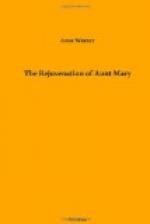Late that afternoon Joshua drove into town (amidst a wealth of mud spatters) and dispatched the answer to Jack’s letter. Aunt Mary was urged to haste by several considerations, some well defined, and others not so much so. To Lucinda she imparted her terrible anxiety over the dear boy’s health, but not even to herself did she admit her much more terrible anxiety lest Arethusa or Mary should suddenly appear and insist on accompanying her. She wanted to go, but she wanted to go alone.
Jack telegraphed a response that night, and his aunt left by the Monday morning train. She had a six o’clock breakfast, and drove into town at a quarter of nine so as to be absolutely certain not to miss the train. Joshua drove, with the trunk perched beside him. It was a small and unassuming trunk, but Aunt Mary was not one who believed in putting on airs just because she was rich. Lucinda sat on the back seat with her mistress.
“I’m sure I hope you’ll enjoy yourself,” she said.
“Of course he’s nothing but a boy,” Aunt Mary replied,—“an’ I’ve told you a hundred times that boys will be boys and we mustn’t expect otherwise.”
They arrived on time, and only had an hour and three-quarters to wait in the station. Toward the last Aunt Mary grew very nervous for fear something had happened to the train; but it came to time according to the waiting-room clock. Joshua put her aboard, and she soon had nothing left to worry over except the wonder as to whether Jack would be on hand to meet her or not.
Joshua drove back home, let Lucinda out at the door, and put the horse up before going in to where she sat in solitary glory.
“I wonder what he’s up to?” she said with a pleasant sense of unlimited freedom as to the subject and duration of the conversation.
“Suthin’, of course,” was the answer.
“Do you s’pose he’s really sick?”
“No, I don’t.”
“Do you s’pose she thinks he’s really sick?”
“Mebbe.”
“Ain’t you goin’ to sit down, Joshua?”
“I don’t see nothin’ to make me sit down here for.”
“What do you think of her going?” she said, as he walked toward the door.
“I think she’ll have a good time.”
“At her age?”
“Havin’ a good time ain’t a matter o’ age,” said Joshua. “It’s a matter o’ bein’ willin’ to have a good time.”
Lucinda screwed her face up mightily.
“If I was sure she’d be gone for a week,” she said, “I’d go a-visitin’ myself.”
“She’ll be gone a week,” said Joshua; and the manner and matter of his speech were both those of a prophet.
Then he went out and the door slammed to behind him.
Chapter Thirteen — Aunt Mary Entrapped
Aunt Mary’s arrival in the city just coincided with the arrival of that day’s five o’clock. Five o’clock in early June is very bright daylight, therefore she was rather bewildered when the train pulled up in the darkness and electricity of the station’s confusion. The change from sunlight to smoke blinded her somewhat and the view from the car window did not restore her equanimity. When the porter, to whom she had been discreetly recommended by Joshua, came for her bags, she felt woefully distressed and not at all like her usual self.




